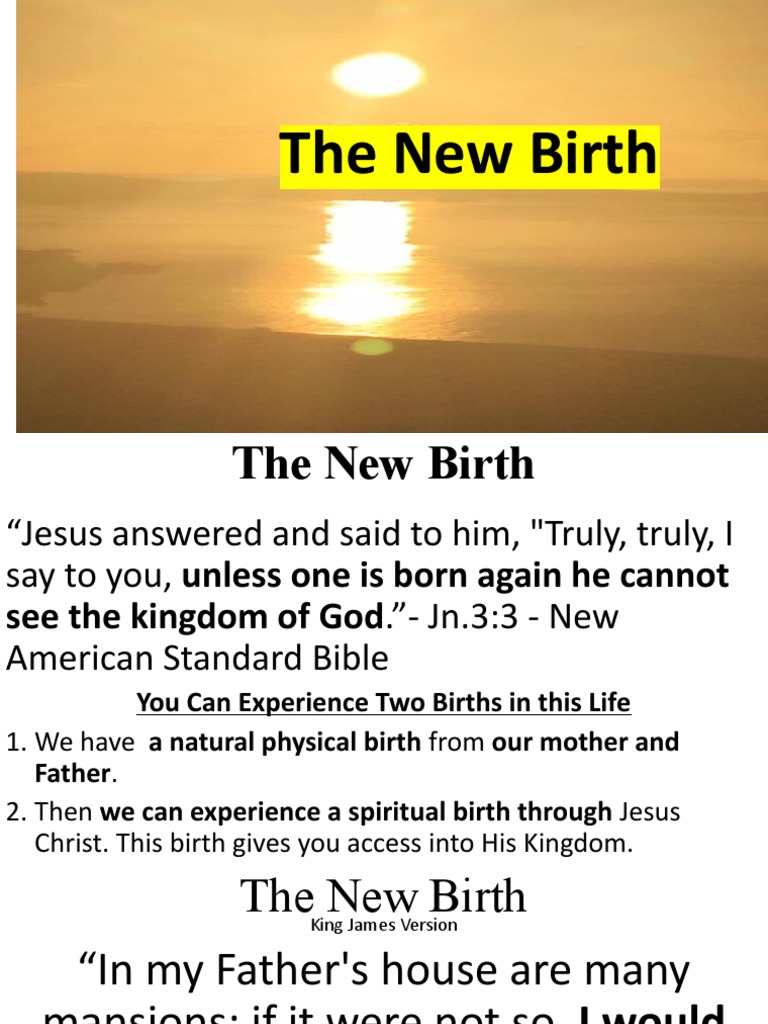The Bahá’í teachings offer profound insights into the spiritual, social, and cultural dimensions of human existence. Central to these teachings is the concept of the Birth of a New Revelation, an event that holds significant implications for humanity’s collective evolution. This notion is deeply rooted in the belief that God periodically sends His messengers to guide humanity, and within this framework, the recent historical manifestations have catalyzed a monumental shift in perspective.
At the core of Bahá’í thought is the understanding of the progressive revelation of divine guidance. The founders of various world religions—such as Moses, Jesus, Muhammad, and most recently, Bahá’u’lláh—are regarded as divinely appointed educators. This sequential unfolding of revelation serves to address humanity’s evolving capacities and social structures. With the advent of Bahá’u’lláh in the 19th century, a new chapter was introduced, inviting adherents to engage with ideas that transcend traditional limits and embrace a global consciousness.
The promise of a New Revelation possesses an intrinsic transformative power. It challenges individuals to shift their paradigms, thereby awakening a latent potential for spiritual growth. The realization that divine guidance is not static, but rather a dynamic process, piques curiosity and encourages exploration. It compels individuals to question their assumptions about spirituality and morality, ultimately leading to a more profound comprehension of their place in an interconnected world.
Bahá’í teachings assert that the new revelation is characterized by themes of unity and inclusivity. At a time of unprecedented global challenges, the emphasis on unity becomes a crucial aspect of the Bahá’í message. The world today contends with divisions predicated on race, nationality, religion, and class; the New Revelation invites adherents to envision a new world where these barriers dissolve. This universal approach not only promotes harmony among diverse groups but also advocates for the essential oneness of humanity, which forms the cornerstone of a peaceful and just society.
In conjunction with unity, another salient theme is the pursuit of knowledge. The Birth of a New Revelation urges adherents to cultivate an insatiable desire for learning and intellectual advancement. Bahá’í teachings encourage the exploration of scientific truths alongside spiritual insights, fostering a holistic approach to understanding the world. This interdisciplinary dialogue enriches individual perspectives and lays the foundation for societal progress. By championing both reason and revelation, the Bahá’í Faith reconciles seemingly disparate realms, propelling humanity toward a more enlightened state of being.
Moreover, the New Revelation emphasizes the importance of individual transformation as a precursor to societal change. Engaging with these teachings necessitates introspection, a quality that invigorates personal development and nurtures moral integrity. The Bahá’í writings encourage individuals to develop virtues such as compassion, justice, and patience—characteristics that empower them to contribute meaningfully to their communities. Throughout history, transformative revolutions have often begun with the awakening of individual consciousness; thus, the teachings lay the groundwork for collective evolution.
In exploring the implications of the New Revelation, one encounters the concept of the “World Order of Bahá’u’lláh.” This vision envisages a global society characterized by principles of justice and equity, where all individuals coexist harmoniously. The establishment of such a world order is contingent upon the collective recognition of the oneness of humanity and the imperative for collaborative action. Bahá’í engagement in social action—be it through education, healthcare, or economic development—represents a practical manifestation of these teachings, channeling the divine inspiration into tangible improvements within society.
The question then arises: how do these revelations manifest in our daily lives? The teachings underscore the importance of communal fellowship and collective service as avenues for individuals to live out the principles of the New Revelation. Engaging with diverse communities fosters understanding, compassion, and solidarity. The Bahá’í community encourages individuals from all walks of life to come together, sharing collective aspirations in pursuit of a common good. This immersive engagement not only cultivates relationships but also stimulates personal reflection and growth.
Furthermore, the Birth of a New Revelation raises pertinent inquiries regarding the future. What does it mean for humanity to embrace these teachings in an age marked by confusion and discord? The teachings advocate for forward-thinking solutions that respect the ecological and social fabric of our planet. The principles of sustainability, equity, and justice inspire innovative responses to contemporary challenges, ultimately inviting humanity to reimagine its relationship with nature and each other. The call for stewardship not only elevates environmental consciousness but also fosters a sense of responsibility toward future generations.
In conclusion, the Birth of a New Revelation in Bahá’í teachings is a multidimensional concept that invites a radical shift in perspective. It fosters curiosity, encouraging individuals to engage in a lifelong journey of discovery while promoting unity, knowledge, and personal transformation. As humanity traverses its complex and turbulent landscape, the teachings provide a guiding framework for achieving a harmonious global society. By embracing these principles, individuals not only fulfill a divine aspiration but also contribute to the unfolding of a collective destiny grounded in love and justice.
